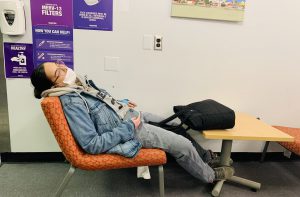At 7 a.m. Tara Champion pushes the covers off her body, leans over and presses the alarm clock button on her buzzing iPhone. As she walks to the bathroom to brush her teeth, there’s only one thing on her mind – her afternoon nap.
Sleeping in the middle of the day may seem like something reserved for children, however, despite college pressures, some students find themselves making time to nap between part-time jobs and studying hours.

“Napping throughout the day has been a huge part of my daily routine,” says Champion. “Since my days can get extremely hectic, a nap absolutely helps me to relax and be prepared to take on a new task.” She has prioritized naps since high school, but during the pandemic, when she had to take all of her classes from home, Champion noticed an increase in napping. “I napped during the pandemic because there wasn’t much more to do but now I nap because I have to,” says Champion.
Champion, a junior and English major at Hunter College, found that taking a few minutes out of her day to rest her eyes has helped her perform better in class – she becomes more attentive and less fatigued. “It is so important for me to have short breaks, especially in the afternoon where a nap is beneficial and leaves me feeling refreshed,” says Champion. “I work more efficiently this way, and it gives me a chance to complete my assignments with better concentration.”
Champion may be onto something.
A University of Delaware study found that students who regularly napped performed better on cognitive tasks, mental reasoning and spatial memory tests. Furthermore, researchers discovered a positive correlation between midday naps and the quality of nighttime sleep, which is essential for improving neurocognitive function in young adults.
Hunter College freshman Yasmin Herrera, struggles to keep her eyes open during class due to her long nights of studying and lack of sleep. “I barely sleep at night so mini naps are useful for me,” says Herrera, adding that if she doesn’t find a time to nap, she often nods off during class. “I sometimes miss important stuff from my classes and end up getting confused about what to do because I fell asleep for a brief second,” says Herrera.
Herrera didn’t find much use for naps before college. She says that her life wasn’t always this busy where a nap felt so necessary. “I think it began during remote learning. I began napping as a way of self-care,” says Herrera. “Now being back at school I’m just sleeping less at night so mini naps just stuck with me because I always feel more at ease after them. They’ve def become a part of my daily routine.”
According to 2021 college student sleep statistics, sleep researchers recommend that people get an average of seven to nine hours of sleep each night; however, the average college student gets less than that.
“It’s a miracle if I even get five hours of sleep at night,” says Hunter College junior Melina Jorge.
Aside from juggling a full-time study load and a part-time job at Union Square Whole Foods Market, Jorge drives for Uber a few times a week to earn extra cash in Brooklyn. “I do a lot throughout my day. I’ve realized that if I don’t nap for at least half an hour, I will be like a walking zombie,” says Jorge. “Napping is a must. Sometimes in between classes, I set my alarm for fifteen minutes. Fifteen minutes have legitimately become enough to give me adequate rejuvenation.”
According to a 2017 Teen Vogue article, universities across the nation began installing nap pods on their campus to make nap time more convenient for students. There are sleep pods in libraries, health centers and other spots on campus at the University of Miami, Stanford University, University of Florida, Texas A&M University, Washington State University and others.
Randa Jumean, 22, a senior at NYU, was never someone who relied on naps to get through her day when she was younger. Yet, these days it’s something she can’t help. “I never considered myself a napper but when school’s demands become genuinely exhausting, I have to nap,” says Jumean. “I have to close my eyes and shut everything off for a bit, practice breathing exercises, whatever helps calm the stress of trying to get it all done before the day’s end.”
